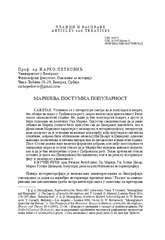Приказ основних података о документу
Marijeva postumna popularnost
The posthumous popularity of C. Marius
| dc.creator | Petković, Žarko | |
| dc.date.accessioned | 2021-10-12T13:11:51Z | |
| dc.date.available | 2021-10-12T13:11:51Z | |
| dc.date.issued | 2020 | |
| dc.identifier.issn | 0352-5716 | |
| dc.identifier.uri | http://reff.f.bg.ac.rs/handle/123456789/3003 | |
| dc.description.abstract | Uglavnom se u literaturi smatra da je popularski pokret, bez obzira na poraz u Građanskom ratu, morao imati svoje pristalice u Rimu tokom sedamdesetih godina. No, jedno je bio popularski pokret, a drugo je bila uspomena na politiku Gaja Marija. Odsustvo svedočanstava da je javno sećanje na Marija uopšte bilo prisutno sve do Cezarovog ediliteta, kao i rđave ocene Marijevog karaktera u memoarskoj i istoriografskoj literaturi, vode zaključku da je uspomena na velikog vojskovođu, vođu populara i spasitelja otadžbine, zapravo bila oblikovana zahvaljujući Cezaru i Ciceronu, odnosno njihovim političkim i ličnim interesima iz šezdesetih i pedesetih godina. Post-Sulin režim nije nametao formalne zabrane, ali među popularima te generacije morao je ostati utisak da je Marije bio izdajica njihovog pokreta, kao i da je bio nepotrebno surov u Građanskom ratu. Takav pretežni utisak ostavio je traga na (Ciceronovo) besedništvo, ali i na rimsku istoriografiju i memoarsku književnost. | SR |
| dc.description.abstract | The idea of the posthumous popularity of C. Marius has never been seriously challenged. However, the lack of evidence that the memory of Marius influenced politics in Rome twenty years (or so) after his death, should be the first indication that the deeply rooted picture of Marius as saviour of the fatherland and leader of pupulares did not in fact exist, at least during the seventies and the first half of the sixties. In fact, the public memory of Marius emerged later, when Caesar and Cicero were motivated to launch the narrative of Marius as a popular leader, the general who saved Italy and the victim of Sulla, the dictator. Caesar took the opportunity to use his aunt's funeral as a Marian and popular manifestation, as described by Plutarch. Nevertheless, that manifestation may have been less Marian and more Iulian, bearing in mind that veterans of the old general had a special reason to be grateful to Caesar's father who was one of the decemviri in charge of land distribution. In fact, the introduction of Marius' imago on that occasion was the first public expression of popular and Marian sentiment, more than twenty years after Marius' death, when the image of Caesar as a popular leader was taking its shape. On the other hand, a few years later, Cicero proclaimed from the rostra that Marius was pater patriae, saviour of the fatherland who had courageously defeated not only the northern barbarians but also the radical tribune Saturninus, who seriously threatened the Republic. Despite the fact that Cicero had some consideration for Marius as homo novus and Arpinatus, it was not his intention simply to revive the sentimental memory of defeated Marius. Cicero's narrative of Marius in the first half of the fifties was dedicated to the last years of general's life, above all his exile and victorious return. This and other Ciceronian Marian exempla, clearly served to magnify the picture of Cicero himself. But he also distanced himself from Marius: for example, the return of Cicero from exile brought peace and glory to the Commonwealth unlike Marius' return which led to the Civil War and extensive bloodshed. Additionally, open critiques of Marius can easily be found in Cicero's oeuvres, and not just in the speeches delivered to the patres, as is commonly supposed. His attitude towards Marius seems more negative than has previously been supposed: even in the speeches made before the people, Cicero's critique of Marius can be detected. When the grand theme of his exile was of less immediate import, Cicero's assessment of Marius - not only in the Philippics, but also in his philosophical treatises and in the letters - approaches the expression of Periocha of Marius as seditionis auctor. This brings Cicero's understanding of Marius' legacy more into line with that of contemporary Roman historiography, which was openly hostile to the general, as Plutarch recorded. | EN |
| dc.publisher | Matica srpska, Novi Sad | |
| dc.rights | openAccess | |
| dc.source | Zbornik Matice srpske za istoriju | |
| dc.subject | rimska republikanska istoriografija | SR |
| dc.subject | populari | SR |
| dc.subject | Marko Tulije Ciceron | SR |
| dc.subject | kraj Rimske Republike | SR |
| dc.subject | Gaj Marije | SR |
| dc.subject | Gaj Julije Cezar | SR |
| dc.subject | The end of Roman Republic | EN |
| dc.subject | Roman historiography | EN |
| dc.subject | populares | EN |
| dc.subject | M. Tullius Cicero | EN |
| dc.subject | C. Marius | EN |
| dc.subject | C. Iulius Caesar | EN |
| dc.title | Marijeva postumna popularnost | SR |
| dc.title | The posthumous popularity of C. Marius | EN |
| dc.type | article | |
| dc.rights.license | ARR | |
| dc.citation.epage | 17 | |
| dc.citation.issue | 101 | |
| dc.citation.other | (101): 7-17 | |
| dc.citation.rank | M51~ | |
| dc.citation.spage | 7 | |
| dc.identifier.fulltext | http://reff.f.bg.ac.rs/bitstream/id/1631/3000.pdf | |
| dc.identifier.rcub | https://hdl.handle.net/21.15107/rcub_reff_3003 | |
| dc.type.version | publishedVersion |

